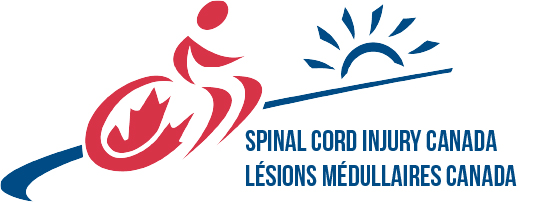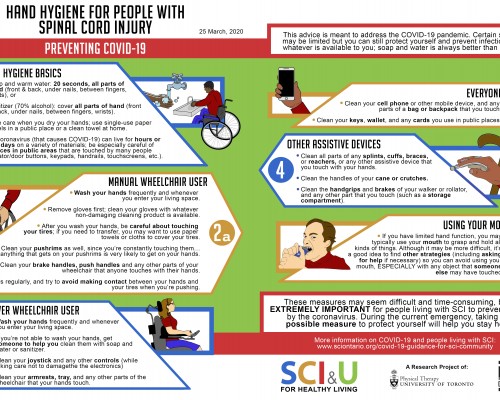This advice is meant to address the COVID-19 pandemic. Certain supplies may be limited but you can still protect yourself and prevent infection using the cleaning products you have; soap and water is always better than nothing.
1) Hand washing basics
- Soap and warm water: 20 seconds, all parts of hand (front & back, under nails, between fingers, wrists), or
- Sanitizer (60% alcohol): cover all parts of hand (front & back, under nails, between fingers, wrists).
- Take care when you dry your hands; use single-use paper towels in a public place or a clean towel at home.
- Avoid touching your face; keep track of where you put your hands and clean those items/surfaces regularly.
The coronavirus (that causes COVID-19) can live for hours or even days on a variety of materials; be especially careful of surfaces in public areas that are touched by many people (elevator/door buttons, handrails, keypads, touchscreens, etc.).
2a) Manual wheelchair users
- Wash your hands frequently and whenever you enter your living space.
- Remove gloves first and clean them with a non-damaging product.
- After you wash your hands, be careful about touching your tires; if you need to transfer, you may want to use paper towels or clean cloths to cover your tires.
- Clean your pushrims as well, since you’re constantly touching them…anything that gets on your pushrims is very likely to get on your hands.
- Clean your brake handles, push handles and any other parts of your wheelchair that anyone touches with their hands.
- Clean your tires regularly, and try to avoid making contact between your hands and your tires when you’re pushing.
2b) Power wheelchair users
- Wash your hands frequently and whenever you enter your living space.
- If you’re not able to wash your hands, get someone to help you clean them with soap and water or sanitizer.
- Clean your joystick and any other controls (while taking care not to damage the electronics).
- Clean your armrests, tray, and any other parts of the wheelchair that your hands touch.
3) Everyone
- Clean your cell phone or other mobile device, and any parts of a bag or backpack that you touch.
- Clean your keys, wallet, and any cards you use in public places.
4) Other assistive devices
- Clean all parts of any splints, cuffs, braces, or reachers, or any other assistive device you touch with your hands.
- Clean the handles of your cane or crutches.
- Clean the handgrips and brakes of your walker or rollator, and any other part that you touch (such as a storage compartment).
5) Using your mouth
- If you have limited hand function, you may typically use your mouth to grasp and hold all kinds of things. Although it may be more difficult, it’s a good idea to find other strategies (including asking for help if necessary) so you can avoid using your mouth, ESPECIALLY with any object that someone else may have touched.
These measures may seem difficult and time-consuming, but it is EXTREMELY IMPORTANT for people living with SCI to prevent infection by the coronavirus. During the current emergency, taking every possible measure to protect yourself will help you stay healthy.

